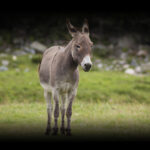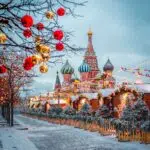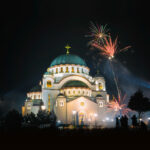Novy God, celebrated on January 14, means “New Year” in Russian. For those wondering why Russians celebrate the New Year at this time, you’d be surprised to learn that the date has changed many times over the centuries. This tradition dates back thousands of years and has a long and complicated history. Though, these days, it’s a chance for Russians to celebrate twice a year! That’s not the only strange tradition — Russians celebrate their New Year with Christmas-like traditions.
History of Novy God (Russian New Year)
Unlike most of the world, Russia gets to celebrate New Year twice! The first is what is referred to as “New” New Year, which is the holiday that falls on January 1 and the second is the Old New Year (or Orthodox New Year), which is celebrated on January 14.
The New Year begins just before midnight when everyone watches the New Year address by the president of Russia, an annual tradition in which the president makes a speech from the Kremlin, followed by watching the famous Kremlin clock strike midnight. The tradition of having the president give a speech started in 1941 when the Soviet government gave a speech regarding the country’s affairs during World War II. Eventually, presidents strayed from politics and began speaking about more cheerful topics, such as family values and the holiday spirit.
Ancient Russians celebrated on March 1. In 988, the Byzantine Empire introduced Russia to Christianity. The Byzantines used a calendar called the Creation Era of Constantinople. This calendar started from the day they believed the world was created according to the Greek Old Testament, “Septuagint,” over 5508 years before the birth of Jesus. However, the Byzantines changed the date to September 1. This is because it was believed that the Antichrist would descend on September 1, 1492. While Russia adopted the Gregorian calendar in 1918, the Russian Orthodox Church still uses the Julian calendar. In 1699, Peter the Great declared that the New Year will be celebrated “the European way” as Russians taking time off in September, a working month in Europe, lost too much money. When Russia adopted the Gregorian calendar, there was a discrepancy of 13 days. Some Russians celebrated on January 1 while others celebrated on January 14. This change now means that even those with a preference get to celebrate twice.
Novy God (Russian New Year) timeline
The Byzantine Empire introduces Russians to Christianity.
Russians anxiously await the End of Days.
Peter the Great changes the New Year to January 1.
Russia adopts the Gregorian Calendar.
The Soviet government starts the tradition of giving a speech on the New Year.
Novy God (Russian New Year) FAQs
How does Russia celebrate New Year’s?
Russians celebrate with family dinners, fireworks, and decorating a fir tree.
Why was Christmas banned in Russia?
It was initially banned by the Soviet Union as the state was atheist. Russians also disliked Christmas as pine trees symbolize death. Later, it was exchanged for a fir tree and the Christmas traditions were adopted during New Year’s, though they are now allowed to celebrate freely.
When is Christmas in Russia?
Most Russians celebrate Christmas on January 7.
Novy God (Russian New Year) Activities
Throw a party
No matter when you celebrate, a New Year’s party is a must. You can even celebrate twice! Get some champagne and food, play music, and enjoy the night with your loved ones.
Follow traditions
Russians start the year with a cleanse by forgiving those who wronged them, cleaning their house, and taking a long bath. Instead of making a resolution, write your wish on a piece of paper, burn it, and scatter the ashes in a glass of champagne. Bottoms up! And don’t forget to watch the president’s speech.
Watch “The Irony of Fate”
Russian New Year is not complete without family and friends getting together to watch the extremely popular Russian rom-com “The Irony of Fate.” Arrange a movie night with your friends and enjoy this uplifting comedy together. Serve some tasty foods while watching the movie, and don’t forget the classic Russian New Year’s dish, Olivier salad!
5 Fascinating Facts About Russia
Most Russians don’t celebrate Christmas
Most Russians are Russian Orthodox, believers without religion, or atheists, so Christmas was only introduced in the 20th century and is thus not part of the culture — this is why Christmas traditions are practiced on New Year’s instead.
They love cats
According to legend, Empress Elisabeth allowed cats to live in the Hermitage Museum in 1745, and there are now 70 of them with hired caretakers.
They invented Tetris
Alexey Pajitnov invented the popular computer game in 1984, introducing it to Europe and North America three years later.
Russia sold Alaska
Russia sold Alaska to the U.S. in 1897 for $7.2 million, which is now estimated to be $120 million with inflation — this was mostly because of the difficult living conditions and lack of natural resources.
They have 11 time zones
One benefit of this is that those who want to enjoy the New Year can watch the presidential speech before it officially airs at midnight.
Why We Love Novy God (Russian New Year)
It feels like Christmas
Russian New Year means decorating a tree with garlands and candy and waiting for Ded Moroz, or Grandfather Frost, to bring presents to the children. Instead of flying with his reindeer, he skis, hikes, and rides on a ‘troika’ (Russian horse-drawn carriage) to reach his destination. He visits during the day and is not afraid of showing his face.
Russians celebrate for two weeks
The discrepancy in the calendars and how close in time the holidays are means that Russians are joyful and festive for those two weeks. It’s common to make extra food on January 1 for the coming celebration.
It’s diverse
The fact that the two dates are formal holidays allows both Christians and Russian Orthodox followers the chance to honor their culture and faith. This is especially important as the Soviet Union did not allow religious holiday celebrations.
Novy God (Russian New Year) dates
| Year | Date | Day |
|---|---|---|
| 2026 | January 14 | Wednesday |
| 2027 | January 14 | Thursday |
| 2028 | January 14 | Friday |
| 2029 | January 14 | Sunday |
| 2030 | January 14 | Monday |















